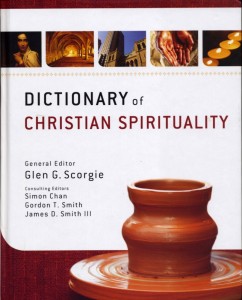 Here’s a large and definitive reference work from Zondervan in 2011, the Dictionary of Christian Spirituality. It’s a brick of a hardcover, but with such an ambitious title, it’s surprising to find it weighing in at just over 800 pages. The editors (Glen Scorgie, Simon Chan, Gordon Smith, and James D. Smith III) seem to be trying for that magical sweet spot for a reference work: not attempting exhaustive comprehensiveness, but guessing in advance what kind of things you’ll want to look up, and including those. “You” means evangelicals, the kind of people who would buy a book with this title from a company like Zondervan. I haven’t read the whole thing (come on, it’s a dictionary!), but I think they’ve done a good job of getting into that sweet spot and producing a really useful book.
Here’s a large and definitive reference work from Zondervan in 2011, the Dictionary of Christian Spirituality. It’s a brick of a hardcover, but with such an ambitious title, it’s surprising to find it weighing in at just over 800 pages. The editors (Glen Scorgie, Simon Chan, Gordon Smith, and James D. Smith III) seem to be trying for that magical sweet spot for a reference work: not attempting exhaustive comprehensiveness, but guessing in advance what kind of things you’ll want to look up, and including those. “You” means evangelicals, the kind of people who would buy a book with this title from a company like Zondervan. I haven’t read the whole thing (come on, it’s a dictionary!), but I think they’ve done a good job of getting into that sweet spot and producing a really useful book.
Then again, I’m not writing an impartial review, because I’m one of the 200 contributors to the volume. I wrote the entries on Fundamentalist Spirituality, The Rapture, and the Second Coming, as well as biographical entries on Horatius Bonar, Charles Cowman, F.W. Faber, Phoebe Palmer, and Gerhard Tersteegen. Hmm, that list makes me sound like a conservative, premillenialist, pietistic reader of devotionals, with a weakness for the holiness movement and good Catholic hymns. Okay, I’ll own that.
But wait there’s more: Torrey’s own Dr. Greg Peters wrote eleven entries. He contributed the four articles on Asceticism, Deification, Hesychasm, and Monasticism, as well as the biographical entries on John Cassian, John Climacus, Evagrius of Pontus, Walter Hilton, Peter of Damascus, Richard Rolle, and Thomas à Kempis. Hmm, that list makes him sound like a world-class evangelical scholar on medieval monastic spirituality.
By the way, there are other Biola fingerprints on the volume. John Coe of the Institute for Spiritual Formation wrote one of the major “Integrative Perspectives” essays that make up the first quarter of the book, and I see shorter entries here by Clint Arnold, Klaus Issler, and Steve Porter as well.